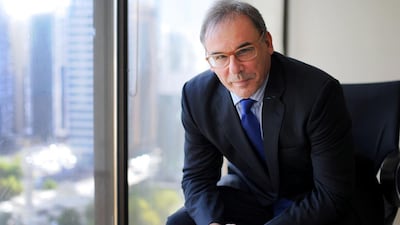Colin Passmore has been doing business in, with, and for Abu Dhabi for the past 23 years.
Now the senior partner of the international law firm Simmons & Simmons, he recalls his first contact with the UAE capital. “It was July 4, 1991, and BCCI had just collapsed. I took a call from the government of Abu Dhabi who wanted some legal advice, and that was the start of it.”
Back then, BCCI - Bank of Credit and Commerce International - was the biggest financial scandal of the day, and the first to have truly global repercussions. Set up in Pakistan, with offices in London and Luxembourg, BCCI turned out to be an international web of corruption that amazed investigators.
It also amazed the AD authorities, which had taken a controlling interest in the bank a couple of years earlier. The capital found itself as one of a long list of victims duped by BCCI executives, some of whom eventually went to prison.
“I was a very junior partner at S&S at the time, but spent a couple of years travelling back and forth from London [where S&S has its global headquarters] to the UAE on the case. It was not my decision, but the firm obviously liked what it saw in the UAE, because in 1994 we opened an office here, one of the first firms to do so,” says Mr Passmore.
BCCI litigation raged on for years after in courts around the world, but S&S was meanwhile attracted to other business opportunities in the Emirates. The firm advised the UAE Offsets group, a government-owned organisation designed to promote trade and technology transfer between foreign companies and the UAE.
The Offsets business sparked the creation of Mubadala, the strategic investment company, although the two are no longer connected.
More than two decades of involvement at the heart of the country’s business has given Mr Passmore a pretty good insight into how the Emirates work. “It is one of the most stable business territories in the region, and the world, and that’s why so many law firms are here. There has been volatility, of course, like the rest of the world, but you have to take the long-term view, like the UAE itself. It would be suicide to back out of a business environment just because the climate gets bad,” he says.
He was in the capital recently to celebrate the 20th anniversary of the firm’s presence in the UAE, and took time to reflect on the transformation. “My goodness, how it’s changed. I can’t find my way round any more. Abu Dhabi has developed enormously, showing the benefit of the policy of being less dependent on oil.
“Now we have clients in infrastructure, energy, life sciences, telecoms and technology, and of course finance. I’m a banking specialist by background, so of course finance is a speciality. Now, there has been a shift to ‘relationship’ law, so you have to market yourself and the work is more challenging,” he adds.
In addition to the original offices just off the Corniche, S&S is also registered in the Dubai International Financial Centre. He sees no tension between the two centres. “I’m not surprised by the move to create the Abu Dhabi Global Market [ADGM], it’s a very logical decision. But I think we can keep operations in both centres long-term. We have a lease here [on the Corniche office] but let’s see how the ADGM goes.”
With the planned opening up of the Saudi market, the firm is using the UAE as its springboard for expansion into the Gulf’s biggest economy. “Until recently, it wasn’t possible just to open up there. But I think they’re serious about it, especially at the level of family businesses. We’ve found a Saudi partner and have opened in Riyadh,” he says.
But the regional market is increasingly crowded, and is no longer the playground of the big western law conglomerates. Emirati firms are increasingly grabbing market share from the westerners. Is the region, and the UAE in particular, becoming over-lawyered?
“It’s certainly more competitive then ever. But the answer lies with the clients. They say they want us here, and there seems to be enough business to go round. But I think there is a place for English law in the region, where we’re still respected,” Mr Passmore says.
Are they respected enough to reap the big-ticket fees that western firms demand? There is a view among some professional service providers – lawyers, accountants, consultants – that UAE clients are reluctant to pay up and on time.
“Certainly since the crisis of 2009, most clients have sought greater value for money. There are very tough regulations here on fees, probably as tough as anywhere in the world,” he says.
The firm views the UAE as an essential part of its global network, in which the US is still the biggest market, Europe is “probably at capacity”, and there has been a noticeable shift in power eastwards since the crisis.
“I spend a lot of time at Terminal 5 [at London’s Heathrow Airport] and probably fly more often than the pilots,” he jokes.

